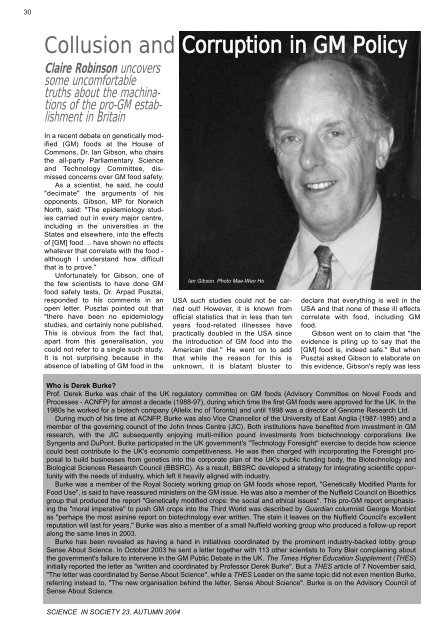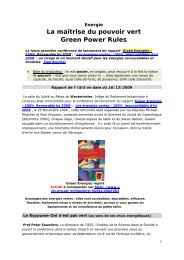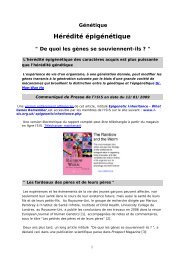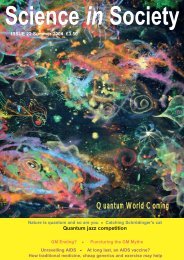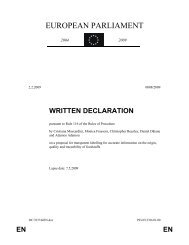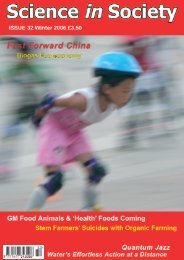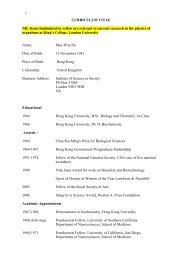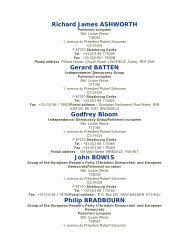Ethiopia goes organic to feed herself - The Institute of Science In ...
Ethiopia goes organic to feed herself - The Institute of Science In ...
Ethiopia goes organic to feed herself - The Institute of Science In ...
You also want an ePaper? Increase the reach of your titles
YUMPU automatically turns print PDFs into web optimized ePapers that Google loves.
30<br />
Collusion and Corruption in GM Policy<br />
Claire Robinson uncovers<br />
some uncomfortable<br />
truths about the machinations<br />
<strong>of</strong> the pro-GM establishment<br />
in Britain<br />
<strong>In</strong> a recent debate on genetically modified<br />
(GM) foods at the House <strong>of</strong><br />
Commons, Dr. Ian Gibson, who chairs<br />
the all-party Parliamentary <strong>Science</strong><br />
and Technology Committee, dismissed<br />
concerns over GM food safety.<br />
As a scientist, he said, he could<br />
"decimate" the arguments <strong>of</strong> his<br />
opponents. Gibson, MP for Norwich<br />
North, said: "<strong>The</strong> epidemiology studies<br />
carried out in every major centre,<br />
including in the universities in the<br />
States and elsewhere, in<strong>to</strong> the effects<br />
<strong>of</strong> [GM] food ... have shown no effects<br />
whatever that correlate with the food -<br />
although I understand how difficult<br />
that is <strong>to</strong> prove."<br />
Unfortunately for Gibson, one <strong>of</strong><br />
the few scientists <strong>to</strong> have done GM<br />
food safety tests, Dr. Arpad Pusztai,<br />
responded <strong>to</strong> his comments in an<br />
open letter. Pusztai pointed out that<br />
"there have been no epidemiology<br />
studies, and certainly none published.<br />
This is obvious from the fact that,<br />
apart from this generalisation, you<br />
could not refer <strong>to</strong> a single such study.<br />
It is not surprising because in the<br />
absence <strong>of</strong> labelling <strong>of</strong> GM food in the<br />
Ian Gibson. Pho<strong>to</strong> Mae-Wan Ho<br />
USA such studies could not be carried<br />
out! However, it is known from<br />
<strong>of</strong>ficial statistics that in less than ten<br />
years food-related illnesses have<br />
practically doubled in the USA since<br />
the introduction <strong>of</strong> GM food in<strong>to</strong> the<br />
American diet." He went on <strong>to</strong> add<br />
that while the reason for this is<br />
unknown, it is blatant bluster <strong>to</strong><br />
declare that everything is well in the<br />
USA and that none <strong>of</strong> these ill effects<br />
correlate with food, including GM<br />
food.<br />
Gibson went on <strong>to</strong> claim that "the<br />
evidence is piling up <strong>to</strong> say that the<br />
[GM] food is, indeed safe." But when<br />
Pusztai asked Gibson <strong>to</strong> elaborate on<br />
this evidence, Gibson's reply was less<br />
Who is Derek Burke?<br />
Pr<strong>of</strong>. Derek Burke was chair <strong>of</strong> the UK regula<strong>to</strong>ry committee on GM foods (Advisory Committee on Novel Foods and<br />
Processes - ACNFP) for almost a decade (1988-97), during which time the first GM foods were approved for the UK. <strong>In</strong> the<br />
1980s he worked for a biotech company (Allelix <strong>In</strong>c <strong>of</strong> Toron<strong>to</strong>) and until 1998 was a direc<strong>to</strong>r <strong>of</strong> Genome Research Ltd.<br />
During much <strong>of</strong> his time at ACNFP, Burke was also Vice Chancellor <strong>of</strong> the University <strong>of</strong> East Anglia (1987-1995) and a<br />
member <strong>of</strong> the governing council <strong>of</strong> the John <strong>In</strong>nes Centre (JIC). Both institutions have benefited from investment in GM<br />
research, with the JIC subsequently enjoying multi-million pound investments from biotechnology corporations like<br />
Syngenta and DuPont. Burke participated in the UK government's "Technology Foresight" exercise <strong>to</strong> decide how science<br />
could best contribute <strong>to</strong> the UK's economic competitiveness. He was then charged with incorporating the Foresight proposal<br />
<strong>to</strong> build businesses from genetics in<strong>to</strong> the corporate plan <strong>of</strong> the UK's public funding body, the Biotechnology and<br />
Biological <strong>Science</strong>s Research Council (BBSRC). As a result, BBSRC developed a strategy for integrating scientific opportunity<br />
with the needs <strong>of</strong> industry, which left it heavily aligned with industry.<br />
Burke was a member <strong>of</strong> the Royal Society working group on GM foods whose report, "Genetically Modified Plants for<br />
Food Use", is said <strong>to</strong> have reassured ministers on the GM issue. He was also a member <strong>of</strong> the Nuffield Council on Bioethics<br />
group that produced the report "Genetically modified crops: the social and ethical issues". This pro-GM report emphasising<br />
the "moral imperative" <strong>to</strong> push GM crops in<strong>to</strong> the Third World was described by Guardian columnist George Monbiot<br />
as "perhaps the most asinine report on biotechnology ever written. <strong>The</strong> stain it leaves on the Nuffield Council's excellent<br />
reputation will last for years." Burke was also a member <strong>of</strong> a small Nuffield working group who produced a follow-up report<br />
along the same lines in 2003.<br />
Burke has been revealed as having a hand in initiatives coordinated by the prominent industry-backed lobby group<br />
Sense About <strong>Science</strong>. <strong>In</strong> Oc<strong>to</strong>ber 2003 he sent a letter <strong>to</strong>gether with 113 other scientists <strong>to</strong> Tony Blair complaining about<br />
the government's failure <strong>to</strong> intervene in the GM Public Debate in the UK. <strong>The</strong> Times Higher Education Supplement (THES)<br />
initially reported the letter as "written and coordinated by Pr<strong>of</strong>essor Derek Burke". But a THES article <strong>of</strong> 7 November said,<br />
"<strong>The</strong> letter was coordinated by Sense About <strong>Science</strong>", while a THES Leader on the same <strong>to</strong>pic did not even mention Burke,<br />
referring instead <strong>to</strong>, "<strong>The</strong> new organisation behind the letter, Sense About <strong>Science</strong>". Burke is on the Advisory Council <strong>of</strong><br />
Sense About <strong>Science</strong>.<br />
SCIENCE IN SOCIETY 23, AUTUMN 2004


